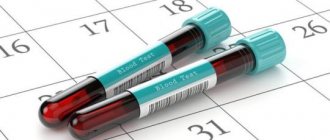HCG after IVF pregnancy
Immediately after gestation, regardless of the method of fertilization, human chorionic gonadotropin begins to be produced in the body of the expectant mother. It is secreted by the membrane of the embryo, which is called the chorion. The hCG content after IVF is used to judge the success of artificial insemination and the course of gestation.
HCG content after IVF
2 weeks after the blastocyst is implanted into the uterine cavity, a test for the content of human chorionic gonadotropin is performed. After in vitro fertilization, its concentration is constantly monitored.
To independently determine the outcome of IVF, you can use a “home” test. A positive result indicates a successful conception, but does not provide information about the course of gestation itself. To track the dynamics of fetal development, an hCG test is done after IVF on a daily basis.
A systematic blood test is carried out for:
- confirmation of successful conception and onset of gestation;
- timely identification of risks for intrauterine development of the fetus;
- diagnosis of genetic pathologies in the development of a child in the 2nd trimester of gestation;
- determining possible risks for a woman (a low level of gonadotropin may signal pathologies of the placenta or ectopic pregnancy).
It should be understood that normal levels of the hormone in plasma do not always confirm the smooth course of gestation. In isolated cases, even with a high concentration in the body, it turns out that the embryo is absent from the fertilized egg. An ultrasound examination is performed to confirm the fact of conception. With its help, the location of the fetus and its heartbeat are determined.
Why donate blood for hCG during pregnancy?
Human chorionic gonadotropin (or “pregnancy hormone”) begins to be produced by the embryonic membrane as soon as the fertilized egg penetrates the uterine wall, and this happens somewhere around 6-8 days after conception.
In the early stages, when the test for diagnosing pregnancy at home does not yet show a clear second line, a laboratory blood test for hCG will help confirm the “interesting situation”, because the concentration in the blood of a pregnant woman is higher than in the urine.
And after registration at the antenatal clinic, a study of blood dynamics for the hCG hormone (in combination with ultrasound) can determine whether the fetus is developing normally inside the womb.
Typically, a blood test for hCG is taken at 11-14 weeks of pregnancy (during the first comprehensive screening - “double test”) and at 16-20 weeks (during the second screening - “triple test”). During prenatal screenings, the b-hCG level is determined in ng/ml (see Table 1-a and 1-b).
Table 1-a and 1-b respectively
Beta-hCG is a component of human chorionic gonadotropin, the quantitative assessment of which is aimed at determining abnormalities in fetal development.
It is especially important to conduct a blood test for gonadotropin in the first trimester of pregnancy if there is a threat of miscarriage. Monitoring the condition of the fetus every week by doing an ultrasound of the pelvic organs is a risk for the baby, because excessive ultrasound exposure can negatively affect the course of pregnancy, since the harmlessness of ultrasound has not yet been proven. But a blood test for hCG is considered a harmless way to monitor the development of pregnancy.
A blood test for hCG is also prescribed if a frozen and/or ectopic pregnancy is suspected.
HCG after IVF by day
Until the 11th week of gestation, the content of gonadotropin in the body of the expectant mother increases. Starting from the 12th week, its content begins to gradually decrease. If the hormone level is low, patients are prescribed hCG injections, with which it is possible to maintain the normal development of the embryo. Therapy is prescribed in situations where the hormone level is approximately 20% below the normal value.
Important! Injections are advisable only with borderline hCG values; if the concentration of the hormone does not increase at all, this signals the absence of gestation.
HCG after IVF: table of norms by day
| Days after successful conception | HCG value in honey/ml |
| 7 | 3-10 |
| 8 | 4-18 |
| 9 | 6-21 |
| 10 | 9-26 |
| 11 | 12-45 |
| 12 | 18-65 |
| 13 | 23-105 |
| 14 | 29-169 |
| 15 | 39-269 |
| 16 | 67-401 |
| 17 | 120-580 |
| 18 | 220-840 |
| 19 | 373-1304 |
| 20 | 521-2005 |
| 21 | 752-3104 |
The above values are relevant only for women carrying one fetus. During multiple pregnancies, the hormone content will be much higher.
A piggy bank of importances!
How does hCG by day?
There is a special table of hCG by day, which presents indicators such as the age of the embryo depending on the level of hCG.
HCG value by day:
- at 1-2 weeks they are characterized by an indicator of 25-156 mU/ml;
- at 2-3 weeks the level is already 101-4870 mU/ml;
- 3-4 weeks – 1110-31500 mU/ml;
- 4-5 weeks – 2560-82300 mU/ml;
- 5-6 weeks – 23100-151000 mU/ml;
- 6-7 weeks – 27300-233000 mU/ml;
- 7-11 weeks – 20900-291000 mU/ml;
- 11-16 weeks – 6140-103000 mU/ml;
- 16-21 weeks – 4720-80100 mU/ml;
- 21-39 weeks 2700-78100 mU/ml.
Human chorionic gonadotropin is one of the most important indicators of the presence and development of pregnancy. The exponential increase in hCG by day of pregnancy begins after the embryo is implanted into the uterus. The chorion produces the hormone already 6-8 days after the fertilization of the egg.
In the first trimester, hCG guarantees support for the corpus luteum during pregnancy and stimulates the production of hormones such as estrogen and progesterone. And this support is necessary until the fetus-placenta system begins to function independently.
In the first weeks of pregnancy, hCG levels double every 2 days. And as the period increases, the level of the hormone increases, but the rate of its increase decreases. So, upon reaching a level of 1200 mU/ml, hCG doubles every 3-4 days, and after reaching a level of 6000 mU/ml, it doubles every 4 days.
The concentration of hCG reaches its maximum at 9-11 weeks, after which the level of this hormone slowly decreases. HCG increases daily in case of twins according to the number of children.
If the concentration of hCG by day differs from the norm and this is definitely not the result of an incorrect calculation of the period, this may indicate a threat of miscarriage or an ectopic pregnancy.
For a more accurate result, the level of hCG should be determined in the blood. It is in it that beta-hCG circulates, and it can be used to determine pregnancy already 6-10 days after conception. In addition, the accuracy of determining hCG in blood is twice as accurate. HCG levels in urine by day of pregnancy are not so accurate.
HCG is produced by the tissues of the embryo itself, so if there is no pregnancy, the hormone is absent. It is best to measure hCG on the 3rd day after a missed period, that is, 7-10 days after fertilization. During this period, its level and concentration in the blood and urine increases significantly.
Interpretation of results
The level of hCG in the blood and the dynamics of its increase after in vitro fertilization allow the reproductologist to come to the following conclusions:
- the hormone content is significantly lower than normal - gestation has not occurred;
- borderline hormone level – placental insufficiency or other fetal pathologies;
- increased hormone levels – multiple pregnancy or endocrine diseases.
An excessive increase in hormone levels in the 2nd trimester indicates genetic abnormalities and abnormal development of the embryo. To confirm the diagnosis, additional laboratory or hardware examination is performed.
Interpretation of the result of a blood test for hCG during pregnancy
Having received the result of the blood test, it is necessary to compare the obtained value of the hCG level with the normative value according to the stage of pregnancy.
Decreased hCG levels
A decrease in the concentration of hCG in the blood of a pregnant woman occurs for the following reasons:
- the threat of spontaneous abortion (in other words, the threat of miscarriage), when there is a deviation of the value from the norm by more than 50%;
- ectopic or frozen pregnancy (hCG level increases very slowly or stops increasing up to 9 weeks of pregnancy);
- chronic placental insufficiency.
Increased hCG levels
An increase in the concentration of the hormone in the blood of a pregnant woman leads to:
- multiple pregnancy (hCG level increases in proportion to the number of fetuses);
- early toxicosis or gestosis;
- intrauterine infection;
- diabetes mellitus in a pregnant woman;
- hydatidiform mole;
- chorionepithelioma;
- pathology of the fetus at the chromosomal level (for example, with Down syndrome and other developmental defects);
- taking synthetic gestagen.
Typically, in women with irregular menstrual cycles or late ovulation, the date of conception may differ significantly from the date estimated by doctors. And such a discrepancy between the established pregnancy period and the real one is reflected in the blood test by an increase in the level of hCG.
Simply put, the gynecologist calculated that the pregnancy period is, for example, 5 obstetric weeks, starting her report from the first day of the last menstruation. But in fact, ovulation occurred later than expected (not 14 days before the start of the next period, but several days before the end of the menstrual cycle), then the real gestational age from conception (ovulation) is 1 week and several days.
Consequently, hCG should correspond to the norm not for the 5th obstetric week, but for 1-2 weeks from conception or 3-4 obstetric weeks. An ultrasound will establish a more accurate gestational age according to the size of the fetus, and the hCG level should correspond to this period.
A high level of hCG only in combination with a decrease in the level of AFP can indicate the likelihood of Down syndrome in the fetus (see Table 5).
Table 5
Reasons for deviation of hCG from the norm
Very often, during IVF, several blastocysts are implanted into the body of the expectant mother at once. In this way, it is possible to increase the chances of implantation of at least one embryo into the uterine wall. In some cases, implantation of all blastocysts implanted in the uterus is observed, which leads to multiple pregnancies. In such a situation, during a blood test, the hormone content in the plasma is high.
Low hCG
If hCG slowly increases after IVF, this may indicate the following conditions:
- fetal freezing;
- threat of spontaneous abortion;
- ectopic pregnancy.
Tests are taken at least 2-3 times to determine the dynamics of increase or decrease in plasma hormone levels. If it is in a borderline state, the expectant mother is prescribed hormone injections. Maintaining hCG at normal levels reduces the risk of miscarriage.
A sharp decrease in hCG
After IVF, the likelihood of fetal death is high, so the level of gonadotropin in the blood is monitored until the 2nd trimester. A critical decrease in hCG levels is a good reason to seek help from a fertility specialist.
Important! To eliminate the possibility of high error in the results of the hCG test, it is recommended that tests be taken in the same laboratory.
Hormonal instability increases the risk of miscarriage or pathological intrauterine development of the fetus. If such a problem is detected, the woman is sent to the hospital for conservation. Artificially maintaining hormonal balance helps prevent miscarriage and normalize the course of pregnancy.
What to do when hCG levels are elevated?
During the first 10 weeks of pregnancy, the level of this hormone increases every 2 days. Therefore, each term has its own indicator. A blood test for hCG is done when there is a multiple pregnancy, its level will be even higher, and the multiplicity will be equal to the number of fetuses that simultaneously develop in the uterus. In this case, the increase is absolutely natural, and don’t let the decoding scare you when taking tests.
When there are no factors influencing an increase in the level of human chorionic gonadotropin, there are several options:
- The gestational age is incorrectly set.
- Synthetic hormones were used during pregnancy.
- The mother suffers from diabetes mellitus or late toxicosis.
- The fetus has hereditary diseases or multiple malformations.
During pregnancy, you have to take a lot of tests, undergo endless studies and tests. All this is done in order to obtain maximum information about what is happening in a woman’s body and to respond in a timely manner to possible deviations. In some cases, a problem discovered at the wrong time can have catastrophic consequences for both the unborn baby and the mother.
HCG for late ovulation
If the cell appears on the 18-19th day of the cycle, then hCG during late ovulation reaches its diagnostic parameters with a delay. The content of the hormone in the blood on the day of implantation of the embryo is 2 mIU/ml and this value doubles every 2 days. It enters the urine a few days later, so its level in the liquid is lower than in the blood.
With late ovulation, hCG should be determined on days 18-20
When to get tested
The level of hCG during late ovulation, suitable for analytics, is reached 18-20 days after the effective act, when it becomes 32 mIU/ml. You should not try to find out about your situation before the announced dates, since it begins to show the answer when the hormone value is 25 mIU/ml. This also applies to donating blood.
Low hCG levels
In case of late ovulation, when hCG shows a false negative result (pregnancy has occurred, but the analysis does not confirm it), the test is repeated after 3-5 days. A questionable answer on the strip strip is possible in the following cases:
- if you analyze your urine ahead of time;
- poor quality tests;
- violation of rules and instructions;
- the woman has diseases for which elevated hCG is normal (diabetes mellitus, oncology, etc.).
If ovulation is late, the hCG test may give a false negative result.











